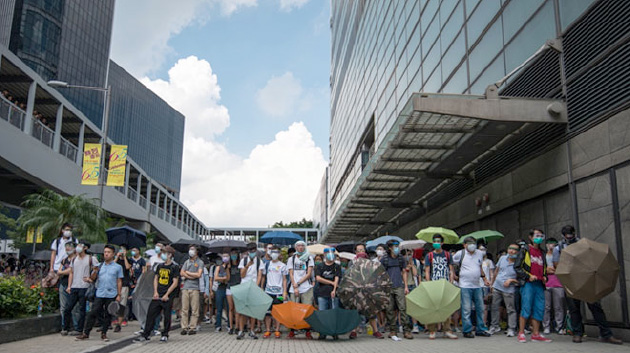Hong Kong Leader Advocates a “We Are Chinese” Education Program
China's Pressures on Hong Kong Increase
Key points in this article:
- The new Hong Kong Chief Executive presses for an education program that will elevate the ‘Chinese spirit’.
- The Majority of Hong Kong People do not think of themselves as Chinese
- The need to promote Hong Kong’s democratization from outside countries
Carrie Lam, who is due to begin office as Hong Kong’s new Chief Executive on 1 July, recently gave a press conference in which she emphasized the need to adopt an education program to elevate the Chinese mentality from childhood.
“We must train [the children] to adopt the mentality that they are Chinese,” said Lam. She proposed to make the learning of Chinese history compulsory in all Hong Kong middle schools.
After the sovereignty of Hong Kong was returned to China in 1997, the ‘patriotic education’ system was introduced in Hong Kong in 2003. This patriotic education was one that embedded the mentality that Hong Kong belongs to China, that the Communist Party is a hero, and that the people of Hong Kong are ‘Chinese’.
In 2012, the Hong Kong government spread a pamphlet that explained its history warped historiographically in favor of the Communist Party. This was a move to officially implement the patriotic education. The people, however, responded with large-scale protests, and this patriotic education lost its footing. Now Carrie Lam is trying to revive this educational brainwashing.
The Majority of Hong Kong People Do Not Think of Themselves as Chinese
Carrie Lam’s intended revival of the patriotic education was due to the movement, especially amongst the Hong Kong youth, pressing for a clean separation from China.
A survey by the University of Hong Kong showed that 63% thought of themselves as “Hong Kong people” in comparison to a mere 35% who thought of themselves as “Chinese”. Likewise, when The Liberty Magazine interviewed people on the streets of Hong Kong in 2015, most of the people made a clear distinction between Hong Kong and Mainland China, and said they did not think of themselves as Chinese.
Forcing a particular identity on the people of Hong Kong through education proves that the ‘One Country, Two Systems’ promise of democracy is losing its power, and Hong Kong is beginning to fall under Communist Party rule.
The Pro-Democracy Camp Rally will be on 1 July
There are, of course, movements inside Hong Kong that are resisting this trend. They are the pro-democracy camp. A member from Demosisto – a pro-democracy group – visited Japan in mid-June for a press conference.
The leaders of Demosisto are former member of Scholarism, the student activist group that led the Umbrella Revolution. The visitors Joshua Wong and Agnes Chow are both leading members.
During the press conference, they explained that the Xi Jinping government is fringing the ‘One Country, Two Systems’ policy. The pro-democracy camp is planning a large-scale protest rally for Carrie Lam’s inauguration on 1 July (the 20th anniversary of the 1997 sovereignty transfer).
The democratization movement is advancing, but the Communist Party will not sit idly by. They have scheduled to deploy their first made-in-China aircraft carrier ‘Liaoning’ to Hong Kong on 1 July, and chairman Xi Jinping will be visiting.
Xi is preparing for his most important government event, the National Congress of the Communist Party of China. No doubt he will attempt to stop the Hong Kong democratization movement to display his powers.
Outside Powers Can Contribute to Deflect China’s Pressures
It is important that the people of Hong Kong continue to demand the rule of law: that both governments observe the One Country, Two System policy. There is, however, a limit to their power. In order to further advance the democratization movement in Hong Kong, the international media and journalists from democratic superpowers such as the U.S. must cooperate to put pressure on China.



















